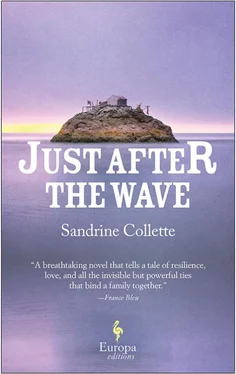Sandrine Collette
JUST AFTER THE WAVE
Translated from the French by Alison Anderson
To Anne-Marie,
Fairies do exist.
I know one.
Louie bent down to pick up the little wet thing the sea had brought to the shore. It lay there motionless, scarcely touched by the water, inching forward onto the earth. It was a blue tit, one of those they’d been trying to protect, before, because they were becoming rare. He picked it up and handed it to his father.
“Here, Pata. Another one.”
His father nodded and held it close. The others looked on in silence. They would go and bury it later, in the place where they had put the dead birds. This was number one hundred and thirty-four: Louie knew the tally by heart.
And like the others, he went back to staring at the raging sea.
* * *
They were like drowned kittens in the rain, clinging to each other with their stunned gazes, their eyes blinking in the gusting wind and the warm downpours. That was the sea there before them, but not only before them. Behind them, to the left and to the right, there was also the sea. They hadn’t had time, in six days, to become accustomed, but they’d understood that the world would never be the same. They did not speak. They just held hands, all eleven of them, father, mother, and the nine children, their faces lashed by the demented weather, the near-constant deluge that obliged them to stay close to the house.
Six days since the wave.
The tidal wave had come and no one had heard it.
Or if someone had heard it, it was already too late.
Should they have expected it? What’s the point of tormenting ourselves , the father whispered, now that it’s done.
Since then they had not seen a single soul; Pata had said they might well be the only survivors, because of that damned hill, which used to scratch the little ones’ feet on their way home from school at the end of the day, yes that hill had saved their lives because it was set too high and rose too steeply. The village was down below, in the valley, where there was nothing left to see. And still, at that moment they turned as one toward the village, as if they’d all had the same thought at once: there in the valley, it was all sea, again.
The wave had swept over the world and taken everything with it: houses, cars, animals, and human beings by the thousands, trapping flesh and concrete walls alike to bury them beneath the swell and the terrifying currents, to crush them and swallow them wholeheartedly—and if the waters had receded, they would have left behind mangled fields, littered with dead bodies and the debris of bones, metal, and glass, but the waters had not receded, they had settled there, invasive and lethal, and for six days they had been transporting fallen trees, broken beams, and corpses with swollen bellies that the little ones watched drift by, trying to recognize them.
And yet, for months the old folk had voiced their warnings. Even though they sensed that something was about to happen, they’d also gotten it wrong, and with a vengeance. But they were no longer here to talk about it, or shout about who was right and who was wrong, because they were all as dead as the next one, and their straw hats floated on the surface of the water, following the currents and meanders of this new ocean. But in all fairness it must be said they’d been only too aware of how the climate was playing up. They had been the first to stare at the heavens and gently nod their heads while frowning and muttering under furrowed brows. This wasn’t normal, they murmured, first among themselves, then before long to anyone who would listen. No, these winds whirling in circles, constantly returning to damage the crops and the houses, these air pockets that upset the animals and painted the sunsets yellow and purple, nothing good would come of it all, nothing anyone knew, and they nodded again, and waited, certain that some day it would come to pass.
That other lot—the governments, the politicians—for sure they knew just as well. But not a squeak. No one spoke about it, other than a handful of nutcases doom-mongering on internet sites, and who were instantly taken for heretics and evil prophets, hauled before the judge or discredited by a dozen studies that had been signed, certified, and validated. The previous winter a few hundred inhabitants had left the region without saying a word—mustn’t cause the real estate market to crash and end up leaving empty-handed. People remembered them with a scornful sneer: Oh, you mean those scaredy cats? And now look.
In short, the old folk had been right, because the heavens and the seasons had gone all out of whack, and an era of storms and small hurricanes had begun. It churned up the sea below them, and every time, the trees lost their branches, like scarecrows amputated first of one arm then the other, and the branches, the trees, crashing and rolling, had killed a few people and quite a few animals, the winds had lopped the roofs off the houses and the waves had dug holes and planted geysers in the sand by that ocean that no longer knew what was going on.
But what the old folk had not foreseen was that the disaster—the real one, the enormous one, the one that had caused thousands or millions of deaths—there was no way of knowing, now—had come from somewhere else altogether: on the sunken island in the sea across from them, the volcano had collapsed, causing a gigantic tidal wave that had swallowed half the planet.
According to the father, who was interested in geology, it was the northern flank of the volcano that had slid into the water with a colossal crash, one hundred million tons of rock, Pata figured, and this had caused the first wave, which was approximately three hundred feet tall; if he had to put a number on it, even a rough estimate, the wave must have shot forward at a speed of two hundred and fifty or three hundred miles an hour. The only thing in their favor was that the groundswell had headed out to the Atlantic; along the coast, they’d only suffered the fallout—a meager consolation when they gazed out at the drowned world around them: the floodwaters had spread over the entire hinterland, and on this too Pata had thought long, concluding gravely that the sea had surely moved three hundred miles inland. Everyone here knew that the same disaster had already occurred a very long time ago, and back then it was the western flank of the volcano that collapsed and produced a groundswell which, despite the distance, went all the way to America, devastating the coasts.
Louie was the only one who saw the wave.
Since then he had been crying at night, and his mother stayed with him until he fell back asleep.
He had seen the wave because he was the one who tended the hens; at seven p.m. precisely, when they had all finished their homework, taken their shower and put on their pajamas, at seven p.m., before supper, it was Louie’s job to check one last time that the chicken coop was properly closed; six months earlier a stone marten, must have been, or a fox, had killed half their poultry, getting in through a loose wire fence, and Louie had sworn never, ever again. He had reinforced all the gates, and kept a close watch. But that night, it wasn’t the hens he’d been looking at, eyes wide, so wide you’d think they’d never close again, it wasn’t the hens that had caused the earth to tremble and his guts with it, sending him to his knees. The wave, towering like some watery monster, made him cry out in terror. It had darkened the sky for miles around him, like a yawning mouth, and had launched its attack on the world, on man and beast.
Читать дальше












